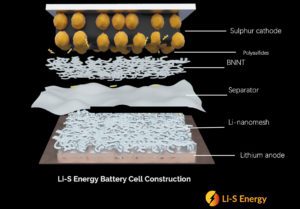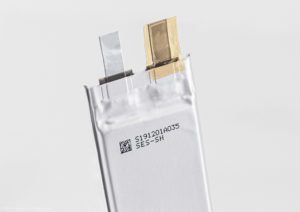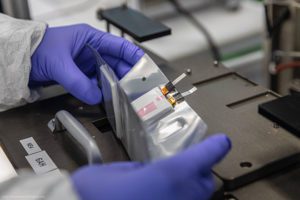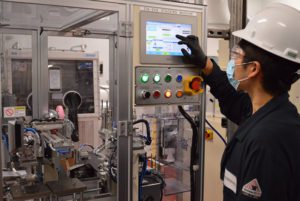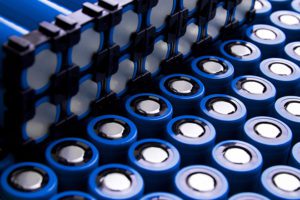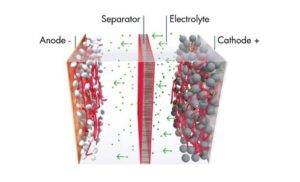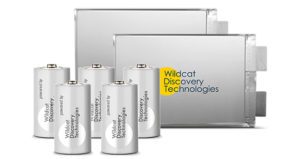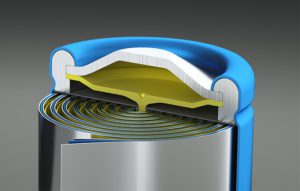Pennsylvania-based venture capital firm Green Swan Partners (GSP) has reached an agreement with Skysong Innovations, the technology transfer arm of Arizona State University (ASU), granting GSP the exclusive option to finalize commercial rights to ASU’s fire-safe battery technologies. The technologies were invented by ASU Regents’ Professor Dr. Jerry Lin, who is also the Chief Scientist… Read more »
Search Results Found For: ""lithium metal""
Li-S Energy and Janus Electric to develop lithium-sulfur cells for swappable battery packs
Australian battery specialists Li-S Energy and Janus Electric are working together to develop lithium-sulfur and/or lithium metal battery cells for Janus’s swappable battery packs. Janus Electric offers products for converting heavy diesel trucks to EVs, based on an exchangeable battery system. Li-S Energy’s lithium-sulfur cells feature a cathode made of sulfur, carbon, a nanomaterial called… Read more »
New SES Li-metal battery reaches 107 Ah
Battery supplier SES has released Apollo, a 107 Ah Li-metal battery for EVs. The company also announced plans for its Shanghai Giga plant, a 300,000-square-foot facility that the company hopes will be capable of producing 1 GWh of batteries annually by 2023. SES has addressed the dendrite safety problem associated with Li-metal batteries by coating… Read more »
SES builds a pilot production line for solvent-in-salt electrolyte production
Battery supplier SES has built a pilot production line capable of scaling up high-concentration, solvent-in-salt electrolyte production. The pilot line is capable of synthesizing SES’s proprietary solvent and manufacturing a high-concentration solvent-in-salt electrolyte formulation designed for SES’s hybrid Li-metal automotive batteries. The facility is currently capable of producing 5 tons of electrolyte per year, and… Read more »
Albemarle to open Battery Materials Innovation Center in North Carolina
Albemarle Corporation has announced the opening of its new Battery Materials Innovation Center (BMIC), located at the company’s Kings Mountain, North Carolina site. The BMIC is expected to be fully operational in July 2021, and will support Albemarle’s lithium hydroxide, lithium carbonate and advanced energy storage materials growth platforms. It has been equipped to enable… Read more »
SK becomes third-largest shareholder of battery company SES
SK has invested an additional $35.9 million in SES (formerly SolidEnergy Systems), a developer of lithium-metal batteries. Coupled with its original $26.7 million investment in 2018, SK now becomes the third-largest shareholder of the battery company. SES, which launched in 2012 as an MIT research lab startup, is headquartered in Singapore, and operates labs and… Read more »
Ultra-high purity lithium salt, LiFSI, facilitates high performance in advanced battery technology
Sponsored by Arkema The lithium-ion battery market is demanding higher energy density, extended lifetime, and improved power performance. Arkema’s Battery Solutions address many of these demands. Advances in electrode materials are addressing energy density, while new electrolyte systems can significantly improve lifetime and power performance. LiFSI, in particular, is a good candidate to replace LiPF6,… Read more »
Solid Power unveils all-solid-state platform technology
Solid Power, a producer of all-solid-state EV batteries, has unveiled details of its all-solid-state platform technology and the three battery designs it enables. The company also announced the transition of its high-content silicon all-solid-state battery to its Colorado-based production line. Solid Power’s proprietary sulfide solid electrolyte powers the all-solid-state platform, which can enable both high-content… Read more »
Wildcat develops new device to measure battery electrode thickness during cycling
Wildcat Discovery Technologies, a creator of high-throughput methods to rapidly design new battery materials, has developed a new Linear Displacement Measurement (LDM) Device that measures small thickness changes in pouch cells during cycling. Developed in partnership with BMW, Wildcat’s LDM capability allows new cell performance feedback as parts of projects with its collaboration partners. Measurements… Read more »
New paper shows atomic-scale closeups of how a lithium-metal electrode ages
Lithium-metal batteries, which use anodes made of lithium metal rather than graphite, could offer great improvements in energy density and weight. The DOE’s Battery 500 Consortium has set a goal of developing lithium-metal EV batteries with triple the energy density of today’s Li-ion cells. Now scientists at Stanford University and the SLAC National Accelerator Laboratory… Read more »





